I do not understand how to implement AVL Trees I understand
I do not understand how to implement AVL Trees. I understand what an AVL Tree is conceptually, but I have no idea how to code it. I\'m having a little trouble. I\'ve implemented my own BST in the code below but do not know the steps I should take from here to make my BST code into an AVL Tree code. I know that balance factor and height need to be manipulated and rotations in the tree need to be made, but I dont know what to do from here. Assistance would be greatly appreciated on what my nexts steps should be, specifically in my add and remove methods. Thanks.
Solution
import java.util.Collection;
import java.util.List;
import java.util.ArrayList;
import java.util.LinkedList;
import java.util.Queue;
public class BST<T extends Comparable<? super T>> implements BSTInterface<T> {
// DO NOT ADD OR MODIFY INSTANCE VARIABLES.
private BSTNode<T> root;
private int size;
/**
* A no argument constructor that should initialize an empty BST
*/
public BST() {
root = null;
size = 0;
}
/**
* Initializes the BST with the data in the Collection. The data in the BST
* should be added in the same order it is in the Collection.
*
* @param data the data to add to the tree
* @throws java.lang.IllegalArgumentException if data or any element
* in data is null
*/
public BST(Collection<T> data) {
if (data == null) {
throw new IllegalArgumentException(\"Collection is null\");
}
for (T info: data) {
add(info);
}
}
/**
* Helps the add method
* @param node the current node
* @param data the data to be added
* @return the previous node
*/
private BSTNode<T> addHelper(BSTNode<T> node, T data) {
if (node == null) {
size++;
return new BSTNode<>(data);
}
if (node.getData().compareTo(data) < 0) {
node.setRight(addHelper(node.getRight(), data));
} else if (node.getData().compareTo(data) > 0) {
node.setLeft(addHelper(node.getLeft(), data));
}
return node;
}
@Override
public void add(T data) {
if (data == null) {
throw new java.lang.IllegalArgumentException(\"Cannot insert \"
+ \"null data into data structure\");
}
root = addHelper(root, data);
}
/**
* Helps the remove method
* @param node the current node
* @param data the data to be removed
* @param aux a node that will return the data removed
* @return the previous node
*/
private BSTNode<T> removeHelper(BSTNode<T> node, T data, BSTNode<T> aux) {
if (node == null) {
throw new java.util.NoSuchElementException(\"Data is not \"
+ \"in the tree\");
}
if (node.getData().compareTo(data) < 0) {
node.setRight(removeHelper(node.getRight(), data, aux));
} else if (node.getData().compareTo(data) > 0) {
node.setLeft(removeHelper(node.getLeft(), data, aux));
} else {
aux.setData(node.getData());
if (node.getRight() == null && node.getLeft() == null) {
return null;
} else if (node.getRight() == null) {
return node.getLeft();
} else if (node.getLeft() == null) {
return node.getRight();
} else {
BSTNode<T> aux2 = new BSTNode<T>(null);
BSTNode<T> pred = getPredHelper(node.getLeft(), aux2);
node.setData(aux2.getData());
node.setLeft(pred);
}
}
return node;
}
/**
* Finds the predecessor
* @param node the current node
* @param aux2 the data of the predecessor when it is found
* @return the subtree without the predecessor
*/
private BSTNode<T> getPredHelper(BSTNode<T> node, BSTNode<T> aux2) {
if (node.getRight() != null) {
node.setRight(getPredHelper(node.getRight(), aux2));
} else {
aux2.setData(node.getData());
return node.getLeft();
}
return node;
}
@Override
public T remove(T data) {
if (data == null) {
throw new java.lang.IllegalArgumentException(\"Cannot remove null \"
+ \"data into data structure\");
}
BSTNode<T> aux = new BSTNode<T>(null);
root = removeHelper(root, data, aux);
size--;
return aux.getData();
}
/**
* Helps the get method
* @param node the current node
* @param data the data you are trying to get
* @return the previous node
*/
private BSTNode<T> getHelper(BSTNode<T> node, T data) {
if (node == null) {
throw new java.util.NoSuchElementException(\"Data is not in \"
+ \"the tree\");
}
if (node.getData().compareTo(data) < 0) {
return (getHelper(node.getRight(), data));
} else if (node.getData().compareTo(data) > 0) {
return (getHelper(node.getLeft(), data));
} else {
return node;
}
}
@Override
public T get(T data) { //needs to be recursive
if (data == null) {
throw new java.lang.IllegalArgumentException(\"Data cannot \"
+ \"be null\");
}
if (root == null) {
throw new java.util.NoSuchElementException(\"Data is not \"
+ \"in the tree\");
}
BSTNode<T> helped = getHelper(root, data);
T gotData = helped.getData();
return (gotData);
}
/**
* Helps the contains method
* @param node the current node
* @param data the data you are trying to get
* @return the previous node
*/
private BSTNode<T> containsHelper(BSTNode<T> node, T data) {
if (node == null) {
return new BSTNode<T>(null);
}
if (node.getData().compareTo(data) < 0) {
return (containsHelper(node.getRight(), data));
} else if (node.getData().compareTo(data) > 0) {
return (containsHelper(node.getLeft(), data));
} else {
return node;
}
}
@Override
public boolean contains(T data) { //needs to be recursive
if (data == null) {
throw new java.lang.IllegalArgumentException(\"Data cannot \"
+ \"be null\");
}
BSTNode<T> helped = containsHelper(root, data);
if (helped.getData() == null) {
return false;
}
return helped.getData().equals(data);
}
@Override
public int size() {
return size;
}
@Override
public List<T> preorder() {
List<T> newList = new ArrayList<T>();
BSTNode<T> current = root;
preorderHelp(current, newList);
return newList;
}
/**
* Helps the preorder method
* @param node the current node
* @param list list that will be returned by the preorder function
*/
private void preorderHelp(BSTNode<T> node, List<T> list) {
if (node != null) {
list.add(node.getData());
preorderHelp(node.getLeft(), list);
preorderHelp(node.getRight(), list);
}
}
@Override
public List<T> postorder() {
List<T> newList = new ArrayList<T>();
BSTNode<T> current = root;
postorderHelp(current, newList);
return newList;
}
/**
* Helps the postorder method
* @param node the current node
* @param list list that will be returned by the post function
*/
private void postorderHelp(BSTNode<T> node, List<T> list) {
if (node != null) {
postorderHelp(node.getLeft(), list);
postorderHelp(node.getRight(), list);
list.add(node.getData());
}
}
@Override
public List<T> inorder() {
List<T> newList = new ArrayList<T>();
BSTNode<T> current = root;
inorderHelp(current, newList);
return newList;
}
/**
* Helps the inorder method
* @param node the current node
* @param list the list that will be returned by the inorder function
*/
private void inorderHelp(BSTNode<T> node, List<T> list) {
if (node != null) {
inorderHelp(node.getLeft(), list);
list.add(node.getData());
inorderHelp(node.getRight(), list);
}
}
@Override
public List<T> levelorder() {
List<T> list = new ArrayList<T>();
Queue<BSTNode<T>> queue = new LinkedList<BSTNode<T>>();
if (root == null) {
return list; //??
}
BSTNode<T> current = root;
queue.add(current);
while (!queue.isEmpty()) {
BSTNode<T> removed = queue.remove();
if (removed != null) {
queue.add(removed.getLeft());
queue.add(removed.getRight());
list.add(removed.getData());
}
}
return list;
}
@Override
public void clear() {
root = null;
size = 0;
}
/**
* Helps the height method
* @param node the current node
* @return the height as an int
*/
private int height(BSTNode<T> node) {
if (node == null) {
return -1;
} else {
return (1 + Math.max(height(node.getLeft()),
height(node.getRight())));
}
}
@Override
public int height() {
return (height(root));
}
/**
* THIS METHOD IS ONLY FOR TESTING PURPOSES.
* DO NOT USE IT IN YOUR CODE
* DO NOT CHANGE THIS METHOD
*
* return the root of the tree
*/
public BSTNode<T> getRoot() {
return root;
}
}
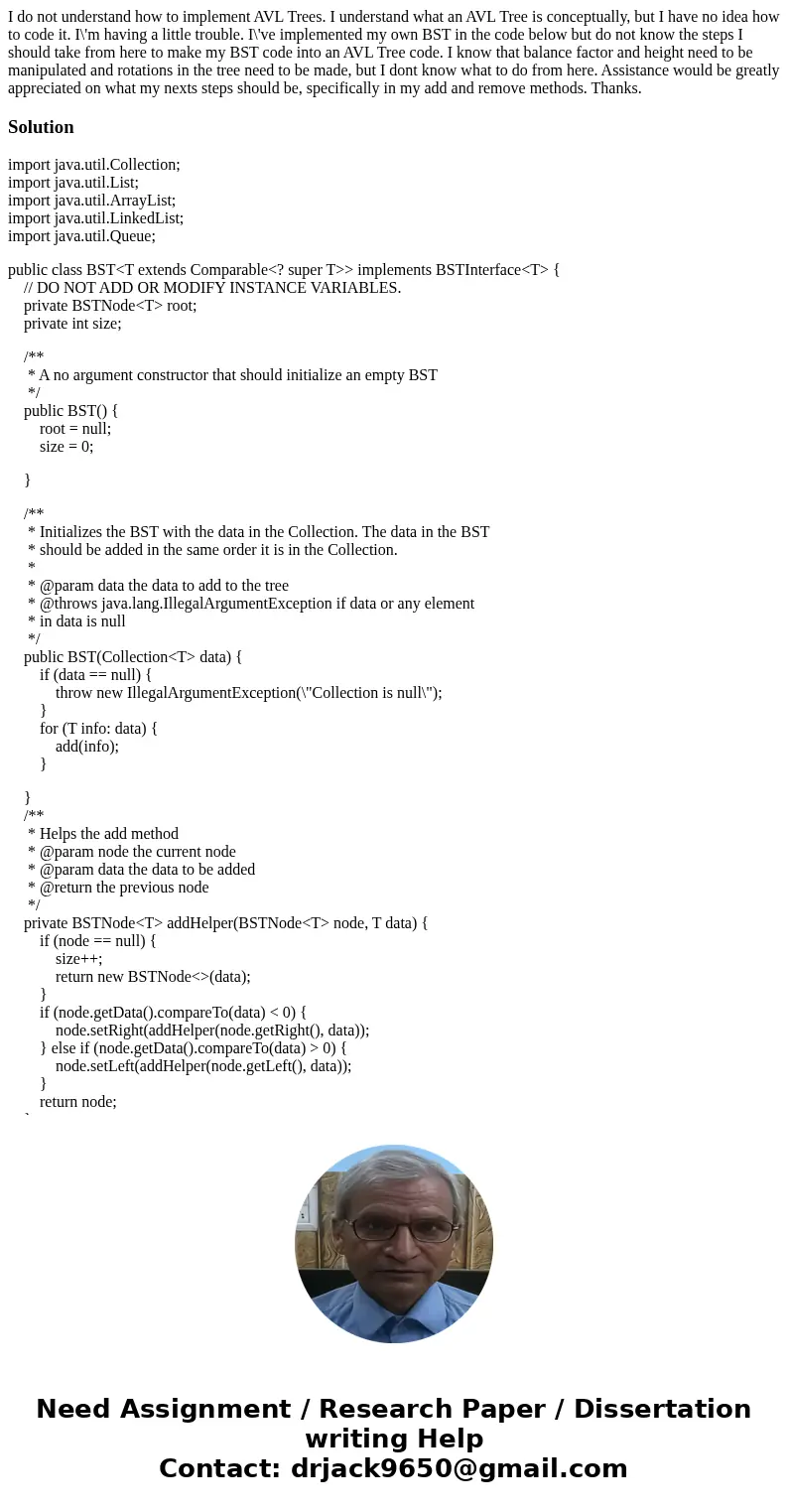
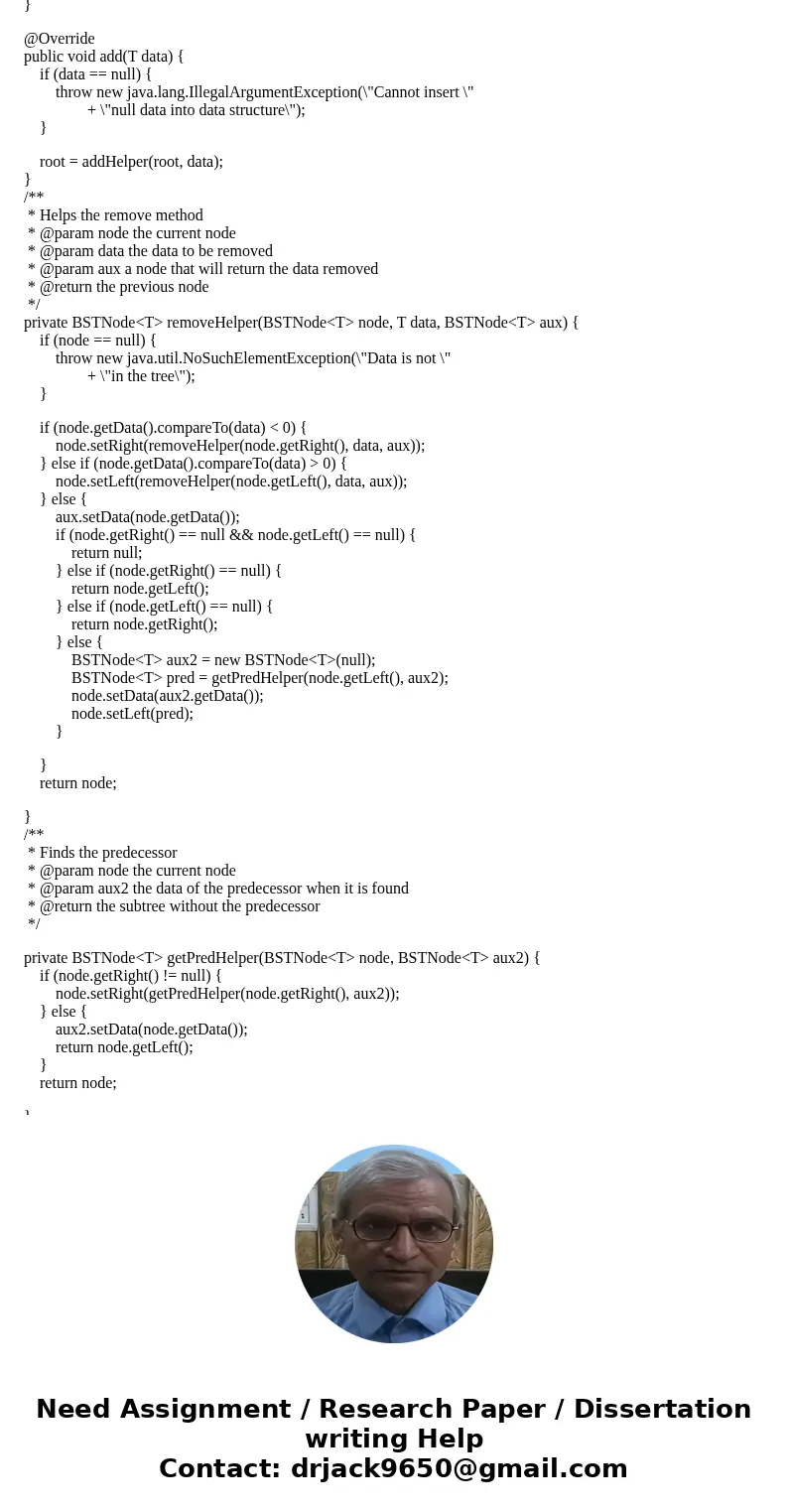
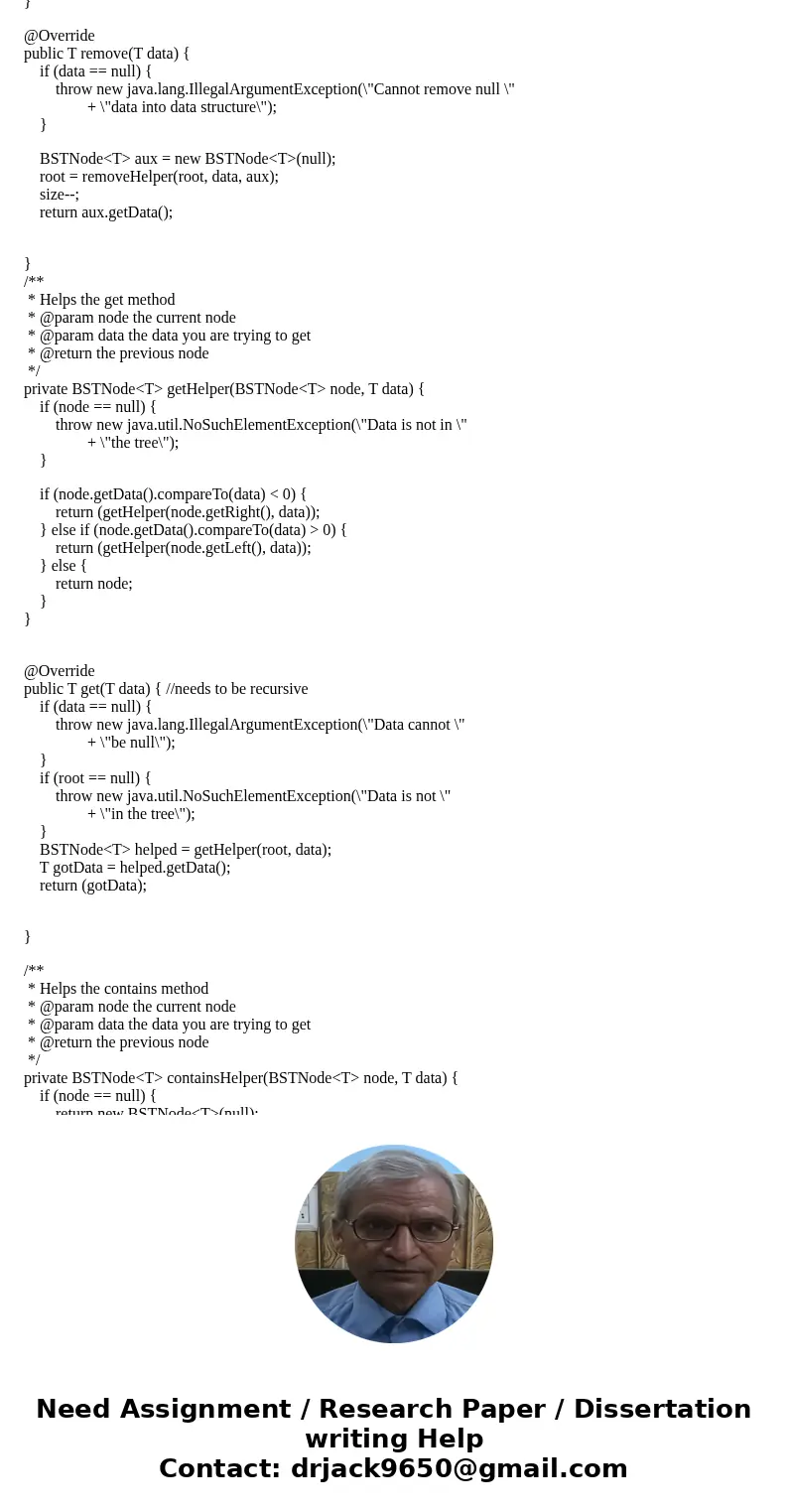
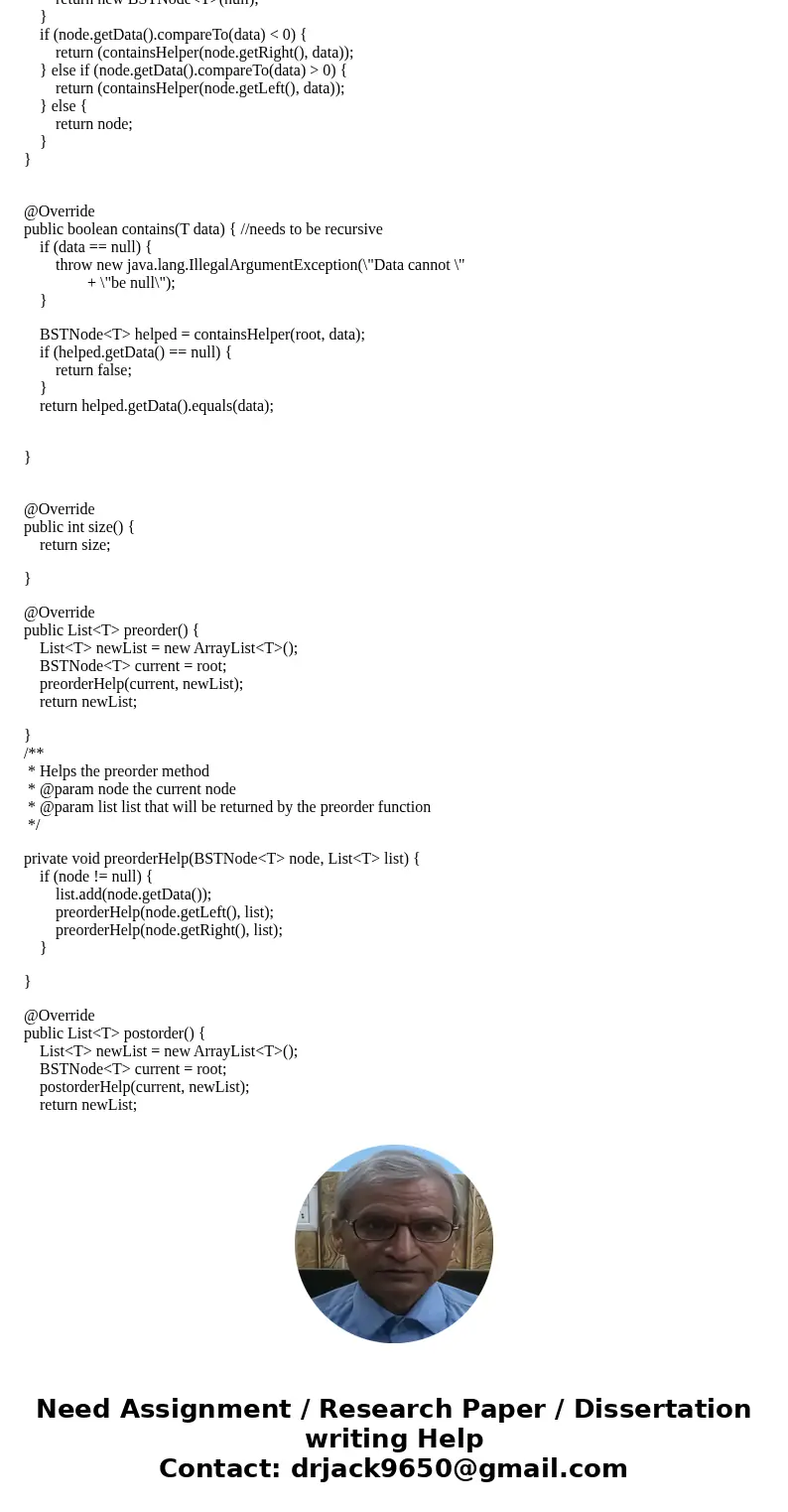
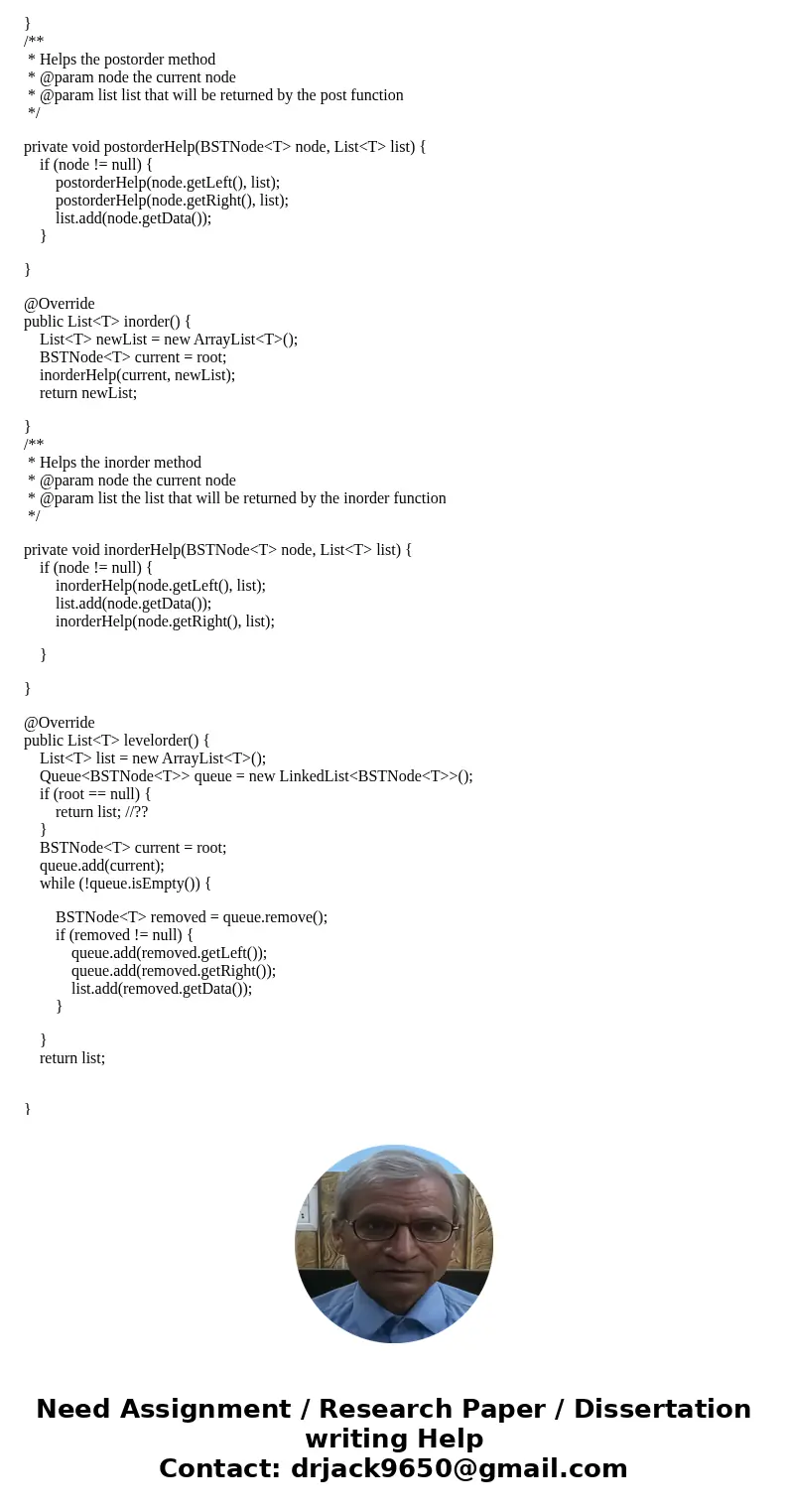
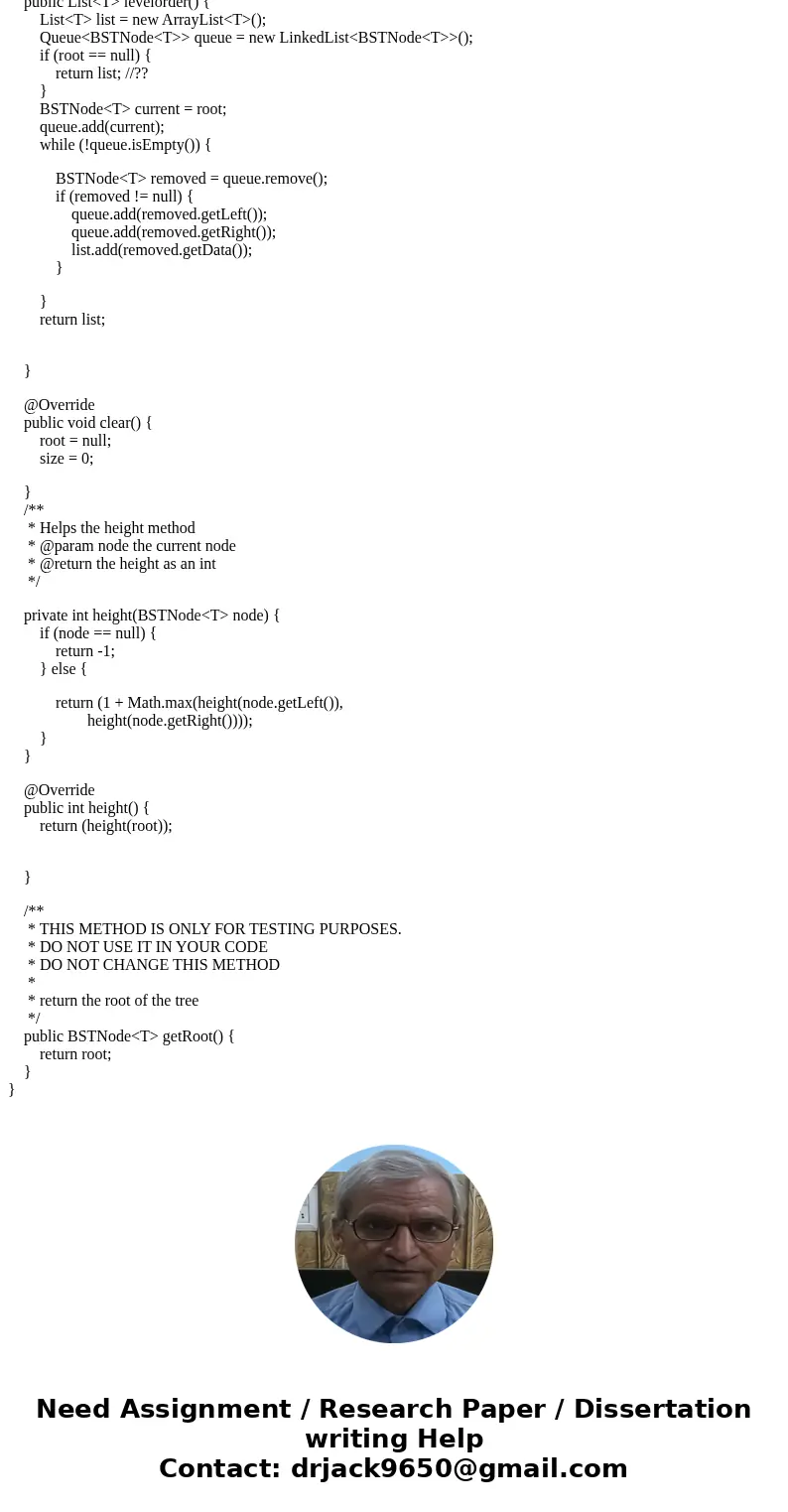
 Homework Sourse
Homework Sourse